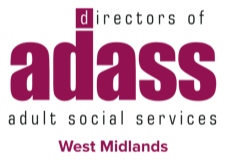The future carries many uncertainties. ADASS West Midlands created the future thinking exercise to allow current and future leaders to explore potential scenarios and policy options for adult social care in this context.
The aim is to help develop the capacity to prepare for any eventuality and ensure that high quality, personalised care continues to be available.
Process
Participants across the three phases of activity included directors, social care staff, WM ADASS Associates, partners (NHS, NIHR, WMAHSN, care providers, voluntary sector organisaions and others) and the WM ADASS Regional Co-production Advisory Network.
Workshops punctuated each phase:
Phase 1: Environmental Analysis. We considered the factors that could impact upon adult social care over the next 12 years environmentally, politically, environmentally, socially, scientifically and technologically
Phase 2: Scenario Development. We considered how the factors identified would play out and impact each other and what set of likely futures do we might start to see (scenarios)
Phase 3: Scenario Deployment. having developed the scenarios, we considered what we would need to do in each scenario to develop the capabilities to be resilient?
Scenarios
In total, four scenarios were developed which offer plausible, diverse, and challenging portrayals of how the context surrounding adult social care might evolve.
Our goal was not to predict specific circumstances or events but to increase the agility, resilience, and effectiveness of local plans and empower those involved. Any reflections made should not be considered policy prescriptions of WM ADASS or its individual members but rather as part of the process of thinking about possible futures and what responses might be.
Exploring the four scenarios has enabled thinking about areas where capabilities might be developed or strengthened. These include: Innovation, Workforce, Personalisation and Equity, Finance, System Working, Business Intelligence and Data Insight, Continuous Improvement and Assurance.
More information on these and how we plan to address them are set out our final report.
